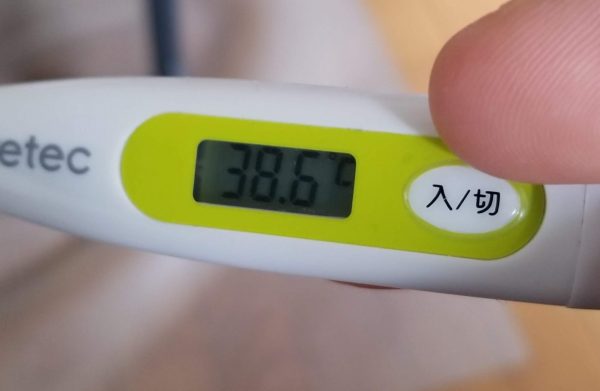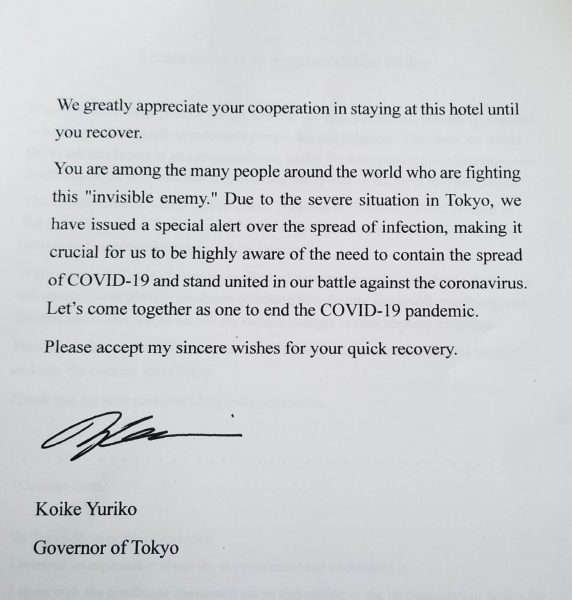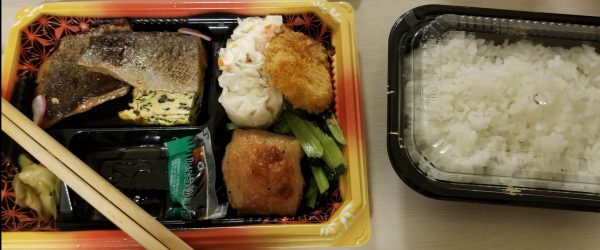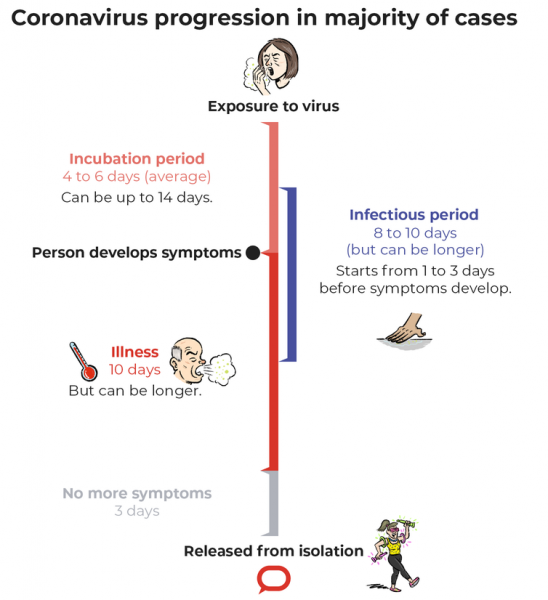Getting Tested for Coronavirus in Japan Used To Be Hard, But It’s Easier Now
I had tried to get tested for coronavirus back in June and found the whole process had been very difficult, and I ended up not getting a test at that time because I didn’t have a fever. Now, however, it seems like the Japanese government has given more open guidelines to clinics and I was able to get a PCR test within 20 minutes of showing up with symptoms. Finding a clinic that will see you is the first part.
I had been following the Tokyo Covid Website by the metropolitan government which gives you a breakdown of how many cases there have been recently. On that site they have a list of contacts so you can see who to talk to if you have symptoms or questions. I called the Covid19 Call Centre back in June when I first tried to get a test, and they gave me a list of clinics in my area that would see people presenting with Covid symptoms. I then called them individually and found that several of them actually wouldn’t see people who had Covid symptoms either that day or at all, until I found one near my house that would give me a check up between certain hours they had reserved to only see people with symptoms.
In June when I first went for a test I got a chest x-ray and a breath test to see if my lungs were under attack, and when it was discovered that they were fine I was sent on my way. Apparently the methods have been updated, because when I went this time they gave me a PCR test, which involved getting into a little zip up tent and spitting into a tube for what felt like forever. For the PCR test they check your saliva for virus particles, so for obvious reasons they don’t want you doing that in the open in their clinic, so here I was in this weird tent spitting into a vial. After that simple procedure they checked my x-ray, which looked fine, and I went back home. It was covered by insurance and I paid 2,620 JPY for the chest x-ray (that came back clean) and the PCR test.

My temperature on the morning I got a PCR test
I was told not to go anywhere or see anybody, so I went home and stayed there, drinking hot tea and resting up. I assumed it wasn’t Covid when I felt much better the next day, and although I felt tired, it was much like getting a regular cold, if a little more serious.
Then I got the call that I had tested positive for coronavirus
I had already recovered from the day of fatigue and high fever that had prompted me to go to the clinic and get a test on Wednesday, so I was surprised. I already felt better by the time I got the phone call on Friday morning.
“Your test is positive.”
It was a bit of a shock and I was still waking up.
“Should I go to the hospital?”
“NO. Stay home, someone from the medical centre will call you.”
I hadn’t left my apartment since the Wednesday I got the test under doctor’s orders. It was the same day I got the positive diagnosis that I lost my sense of smell and taste. I had been careful and worn a mask everywhere I went, but like most other people I was getting on with my life after the stricter lockdown measures have been lifted in Tokyo since mid-June. I have been going in person at the private school where I teach, and my first thought was about my students. Thankfully we have had pretty strict procedures at school including opening all windows and doors all the time, and everyone is wearing a mask. More than a week after my diagnosis there have been no other reported cases at my school at the time of writing.
The medical centre for my city ward needed to speak with me. I got a call from a kind lady who was very helpful and walked me through what would happen next. She said I would have to go into a quarantine facility. I asked:
“Can’t I just stay at home? I live alone…”
“No you can’t. We have to monitor you to make sure you get better, and ensure that you don’t spread the virus in the following week where you are likely to still be infectious.”
The lady told me that a taxi would come and pick me up on Sunday and take me to a quarantine hotel. This was in a mix of English and Japanese because, although she could communicate in English, I think my Japanese was better than her English. A taxi picked me up from outside my place on Sunday. It had a big plastic sheet between me and the taxi driver that had been taped strongly to all of the walls and surfaces. I said “konnichiwa” when I got in but the driver didn’t respond or look at me, so I took the hint.
Going into Quarantine
The taxi had brought me to a hotel in Toranomon to stay locked up until I was no longer contagious. As I entered the lobby I saw that they had food and drink left on the side with a sign saying “take as you please”, and on another table a series of envelopes, one of which had my name on it. Inside was a room key and a set of instructions.

A letter included in the packet I received when I checked in to quarantine hotel
I went up to my room and dropped my bag of stuff in the corner. The room has a double bed with a mis-fitting sheet and a single soft pillow. There was a desk and a TV, which I never turned on. It’s enough, but I definitely felt a little cramped within a few days. I had brought a couple of resistance bands so I could do some exercise in the small space while I was locked down, but I had bouts of muscle pain and fatigue, and generally avoided doing any exercise more strenuous than walking around.
At 8am, 12pm and 6pm there is a voice over the intercom system telling everyone to come down to the lobby and collect their bento box with a meal. There is a row of microwaves where I and the other people quarantining can heat up our lunches. I wish I could tell you how the bento box tastes, but I lost my sense of taste and smell in the days before I went to quarantine, so I could never taste the food. Probably for the best. I went down into the lobby and a group of mostly Japanese people were all getting their bentos in silence. I tried to say hi to a few of them but everyone seemed pretty much like they didn’t want to talk about it. One Nepalese guy said “Hi” to me every mealtime, but everyone else just averted their eyes and got their food in silence. Awkward…

Covid Quarantine Bento Box – No idea how it tasted…
The room had free Wi-Fi that was just good enough to watch Netflix, so I watched a few episodes of Community for the umpteenth time. I also had enough time to do a bit of writing and some work, and to catch up on a little reading I had been putting off due to having a lot of other work to do. On the day before they had told me I was to be released I got a call to the phone in the hotel room with instructions, so I asked:
“Am I going to get another test before I leave to make sure I’m no longer infectious?”
“No, the guidelines say that after 10 days from symptoms presenting that you are no longer infectious if you haven’t had a fever for at least three days.”
Following The Science – It’s Still Being Updated
I checked out what the nurse told me and sure enough, the guidelines from the United States CDC and also the WHO’s most recent guidelines.

Japanese medical professionals followed the international guidelines to the letter
A big part of my worry going into quarantine and coming back out the other side was whether or not the Japanese system is following what we currently know about Covid19. Given how we all know from going to Japanese clinics that the medical establishment in Japan kinda straddles the line between Eastern and Western medicine, I was concerned that they would give me half the dose of medicine I needed or something, but once I was locked down, I spent a little time looking up and researching things like quarantine and recommended medical interventions, and was pleasantly surprised to see that the Japanese medical establishment was following the most up to date guidelines I could find online.
For the average person who doesn’t need to be hospitalised (somewhere north of 90% of people who catch Covid19 have mild or moderate cases) the main thing you need to do is avoid other people and prevent spreading the virus. I’ve been taking vitamin supplements and zinc as a precaution, but I really have no idea if these help and have only read observational studies about the efficacy of supplements. However, it stands to reason that you should be preparing the terrain of your body for coronavirus, even if you don’t have it. I put my mild case down to my youth and health, but also eating healthily, drinking plenty of water and taking Vitamin B12 (with thiamine and folate) Vitamins C & D and also Zinc. The evidence is still coming in, but numerous studies found that Vitamin D deficiency correlates very highly with coronavirus (1, 2) so getting enough Vitamin D especially when the sun isn’t out to let us naturally synthesise it should be a priority. Most of the supplements you would get back home are available from iHerb, which incidentally was where I got my protein powders so I already had an account.
As I’m getting out of quarantine my sense of smell is just starting to come back – I tasted my mint toothpaste on the morning I was released and have been told that this is likely to come back little by little. Some people are still struggling with it months later, but since I’m already starting to get it back I doubt it will afflict me much longer. I put my mild case down to my general health and taking the right supplements to prepare my body to fight off coronavirus.
Coming home and carrying on with normal life
I’m out of quarantine now and should be able to return to my teaching job once I have fully recovered. I was very lucky that I tested positive during a test week and so I’m not going to be missing many classes, as this week I wouldn’t have been required to come in anyway. It is a pain in the ass and an inconvenience to get coronavirus and be quarantined. As far as I know this wasn’t optional, but I am also very grateful that I didn’t have to pay for my hotel stay.
The only thought I did have was about getting tested upon leaving quarantine. I don’t understand why they wouldn’t do a test as I checked out to make sure that I was safe to release. However I doubt after the expense of moving me to a hotel and hosting me there for a week that they would opt to save a few pennies on a PCR test which they can do for a pretty reasonable price. After speaking with the nurse from the medical centre, I found out that it is likely that a PCR test would come back positive for several weeks after being cleared of the infection, as my body will still be killing off infected cells which will be kicked out of my body in saliva. It looks like my cough could persist for a while, but that my risk of infecting others is still very low.
I hope this article reassures you that Japanese authorities are not only taking Covid very seriously, but also putting a lot of resources into keeping people who have tested positive safely away in quarantine while they are infectious. Personally I was impressed by how well organised the system is, and perhaps it gives me some hope that Japan is as safe a place to be during this pandemic (what with everyone wearing masks and everything). Experiencing the system they have in place now also reassured me that they aren’t deliberately hiding the numbers, as it was not difficult to get a test right now in October 2020, even as a foreigner with limited Japanese ability. I have a little more trust in the numbers now.


